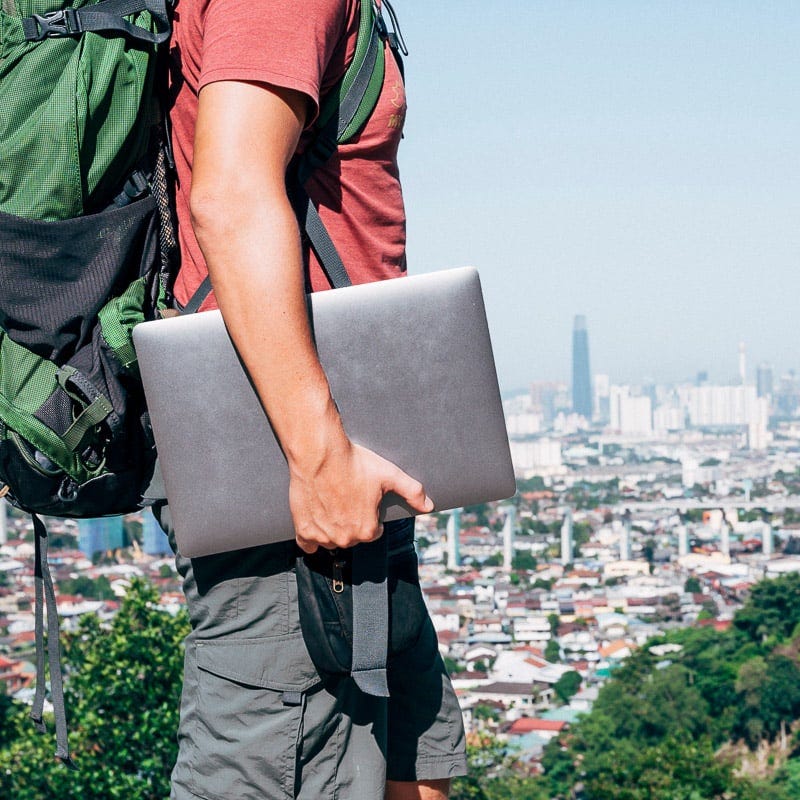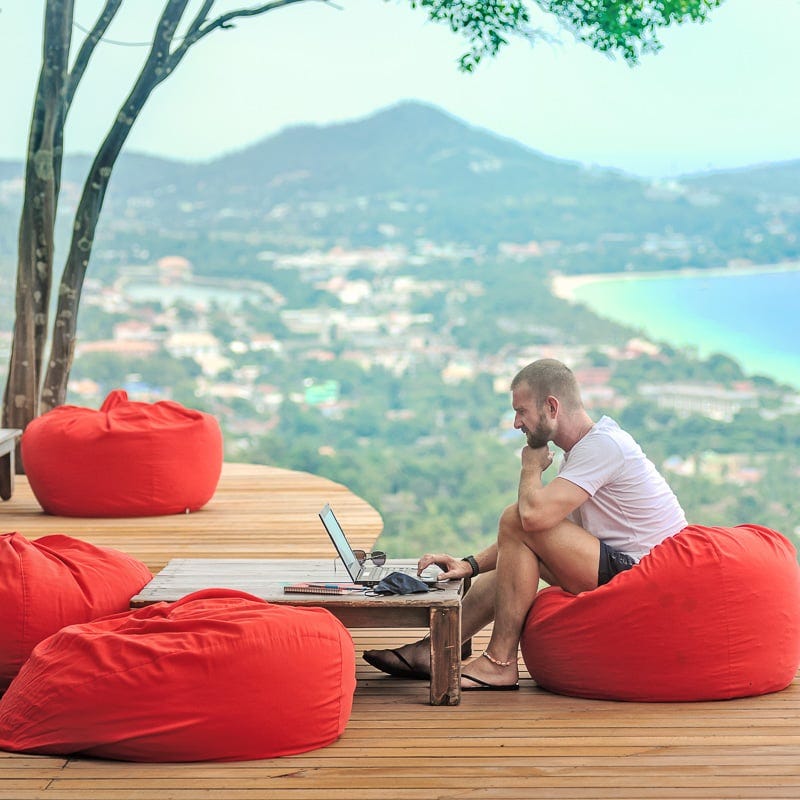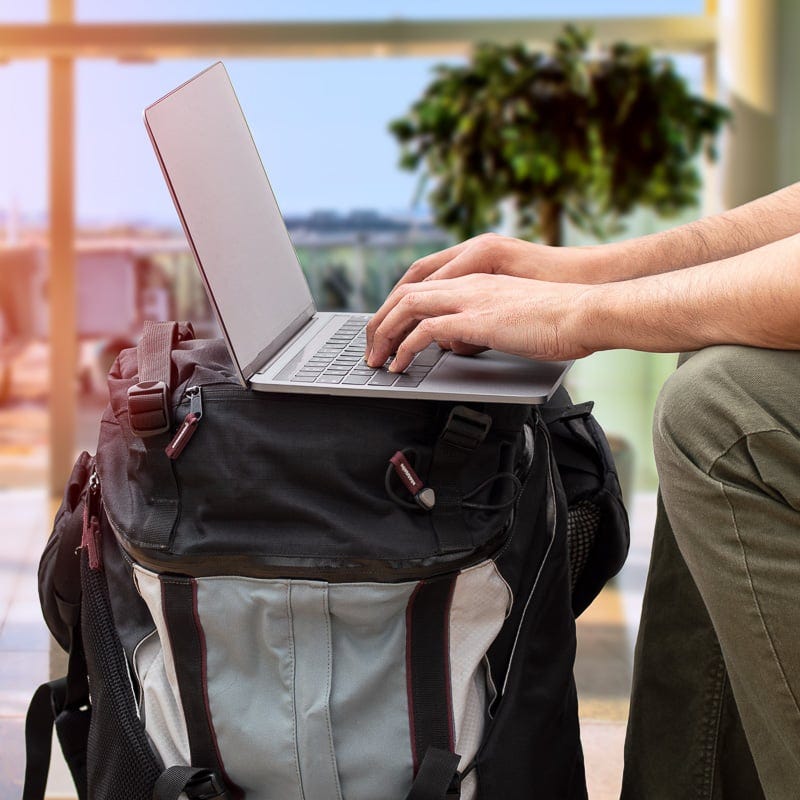Life is an open-book test.
(Disclaimer: For information and entertainment purposes only. Not intended as personalized advice of any sort. Please consult a qualified professional.)
From Travel Off Path – “The Ultimate Cheat Sheet To Becoming A Digital Nomad”:
Everything You Need To Prepare For Life As A Working Wanderer
Digital nomadism has been on the rise for the past decade as more and more people realize that working doesn’t necessarily need to bind them to one place. Since the pandemic forced millions to work remotely, proving that, in many cases, an office was never a necessity, the number of workers choosing to take the plunge has skyrocketed.
I’ve been one for the past three years, cutting the ties from my former office job, teaching English online for two years before finally beginning work as a writer, something I’d wanted to do since I was young. In that time, I’ve visited almost thirty countries, spending at least a month in almost all of them. It’s a wonderful way of life and something I’d recommend to anyone feeling the itch.
Being a nomad does have its tribulations, though, from work-related hiccups to accommodation qualms, there are unique challenges you won’t find at home. To help, I’ve created this cheat sheet to get you on your way with confidence.
1. Pick your accommodation wisely
Choosing where to stay depends on so much more than it did previously. Since becoming a writer, my needs have switched drastically. My partner and I utilize accommodation apps like Airbnb, typically going for heavily discounted monthly stays. When we first started traveling, we both taught English, working at the same hours. For noise purposes, we always required at least two rooms, while the wifi connection had to be strong enough to cope with two people streaming and sending video at the same time.
When we picked the wrong apartment, I found myself teaching in tiny bathrooms, literally sitting on the toilet to teach some kids for hours at a time. If the host had overblown the wifi’s speed, we were then reliant on our phone’s hotspots. Future reference, Mongolian cellular reception is not conducive for anything.
It’s much easier now, as we don’t have specific requirements, but we still sometimes ask the hosts to show us a screenshot of an internet speed test to guarantee we will get that much. For tips on not choosing a bad Airbnb, check out our sister website’s, the Cancun Sun, guide here.
Just make sure you have a good brainstorm about your exact requirements for where you’ll be staying.
2. Pace yourself and don’t compare
Choosing life as a digital nomad is extremely different from life in a traditional setting. It offers a sense of freedom that might become overwhelming at times if you don’t keep it in perspective. Remember that everyone is doing it for a different reason. Some people just enjoy having the flexibility, and while the change of scenery is a huge perk, travel isn’t necessarily their main focus. You might find these people living for six months in one place, living what appears to be a fairly typical work life.
Others, probably more akin to myself, move around all the time. Remote work is my vehicle for travel, and I purposely set my schedule up to maximize my time seeing the world. With that said, it’s impossible to live like a backpacker while you do this. Put as simply as possible, I’d burn out.
I do, however, struggle with traveler’s guilt, easily the most first-world problem ever created. If I have a work-heavy week where I don’t go out and explore the city I’m in, I get the overwhelming feeling of not taking advantage of where I am. I’ll meet backpackers who have rattled through a list of fifteen things in three weeks, while I’ve only seen two of them. I’ve worked to find value in the slower pace, seeing as many things as I can while not being afraid to have a quiet night when I feel like it.
It’s important not to compare your experience with others doing what might feel like the same thing. Set your own pace, prioritize the things you want to, and your life as a nomad will be nothing less than fulfilling.
3. Give yourself the best tools
Working from anywhere can be complicated. Some cities are packed with co-working spaces and quiet cafes where working is as close to being in an office as can be, while others don’t have the same things available.
If you’re heading somewhere a little less equipped, make sure you have everything you need to keep yourself focused. A good pair of noise-canceling headphones is all I usually need to avoid the chaos of a noisy cafe or bar. I use the Sony WH-1000XM4, which does an outstanding job of blocking out the rest of the world.
With your laptop, you don’t want to be lugging around a huge machine too much, but working on a tiny screen can be frustrating after a few months. I loathe my current laptop, a tiny MacBook 12 inch with one port. As a 6’3 man, I look ridiculous hunched over its tiny keyboard, and I’m upgrading to something larger now. Other friends, I have countered the frustrations of a small laptop by buying stands, Bluetooth keyboards, and mouses. This helps simulate a desktop setup and helps them feel more productive.
Portable chargers should be in your bag at all times. Not all cafes have an outlet for use, and you don’t want to be fighting for it against other nomads.
4. Apps are your friend
Apps are massively important to make life easier while globe-trotting for work. Virtually any problem you can imagine has been addressed by some kind of app. These are the ones I rely on the most.
Airbnb – accommodation. Monthly stays are cheapest and offer huge discounts
Speedtest – automatically tests the speed of the wifi that you’re connected to
NordVPN – A VPN service. Super important for security. It keeps you secure on public wifi. It also has the added perk of letting you watch content from different countries on Netflix and other streaming sites. It can also be used to hack your flight prices too.
Whatsapp – Messaging app. Even as you move through different sim cards or if you lose your phone, you’ll still be connected to all the people you need to be. Bridges the awful gap between iPhone and Android users.
Google maps and maps.me – google is the king of navigation tools. No other app gives so much information. But maps.me regularly has footpaths not recorded on other apps. Download the country you’re in and have it all without needing the internet.
iCloud, google drive, and similar service – These are all cloud services. You never know when the worst could happen. Your laptop is damaged, stolen, or lost, and so is all your work. Back everything up regularly so you can get straight back to it when you’ve sorted yourself.
Every airline you use’s app – You’ll be flying more than most, so it pays to have the best info from every airline. Make things easier and ensure you have the apps
5. Budget
One of the biggest misconceptions about being a digital nomad or traveling full-time is the cost. I’m always asked if I’m rich or making a load of money to be able to travel so much. In reality, traveling can be far cheaper than living in one place for a long time. Assuming you’re not paying a mortgage or rent back in your hometown, you’ll be pleasantly surprised to find everyday life can often be highly affordable abroad, and sometimes for an even better standard of living.
Wonderful apartments in Southeast Asia can be found for as little as $400 a month. If you feel like splashing on something brilliant, $1000 could have you living like royalty. With that said, keep a budget in mind. If everything is cheaper, it’s easy to accidentally buy more than you ever would, and that price difference evaporates in the long run.
Be aware of your finances, understand how much you’re going out to eat and drink, and there’s a great chance you’ll have an impressive pot of savings by the time you’re done.
6. Get paid to spend
Despite what you’re warned about your whole life, credit cards are amazing. They have you covered in more ways than a debit card does and come with a multitude of perks, not least the ability to earn points.
Sign on bonuses and bonus points for specific types of spending adds up, and with some proper research, you can cover a huge amount of your yearly travel expenses. I’ve not paid full price for a flight in two years, which has been especially useful this year as the cost has soared.
The danger from credit cards comes in the form of overspending. Treat it like a debit card, and don’t spend money you don’t have, and you’ll be fine. Just remember, if a bonus require you to spend $6000 in four months to get 50 thousand points, but you usually only spend $4000 in that time, it’s not a good idea. Only spend money you were going to spend in the first place.
7. Community goes a long way
The digital nomad space is a fast-growing one, and having support can be a huge boost. Picking cities with digital nomad populations can help with this. Regular meetups, recreation, and general support can make the transition smoother.
If you’re not in a digital nomad hub like Lisbon or Medellin, join expat Facebook groups. Any question you want to be answered, from where the best grocery store is to solid gyms, can be asked there. Expect a lot of replies, as everyone likes to give their own advice.
8. Timezones
This is hugely important, depending on your profession. If you’re your own boss and set your own hours, you’re golden. If you’re working remotely for a larger company and need to be on a meeting at 3PM in New York, maybe reconsider Kuala Lumpur unless you’re cool waking up at 3 AM.
If your employer is cool with the flexibility, do your best to thank them by working out a schedule that benefits both of you. They’ve already let you work from around the world. Don’t force them to accommodate schedule changes every week because you don’t want to get up early. Consider the implications.
9. Insurance
Don’t be the person that doesn’t get it. It’s so important to be ready for every eventuality. On a two-week trip, you might risk it, but you could be gone for years. Things happen, and while hospitals abroad generally aren’t as expensive as in the States, they can be pricey and add up if it’s serious.
There are several big names out there like Safety Wing, which is a great option.
But there you have it. All of the words of wisdom I have on being a successful digital nomad. Get out there, make some money, and see the world.










